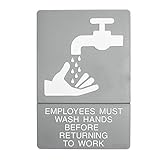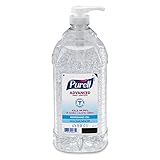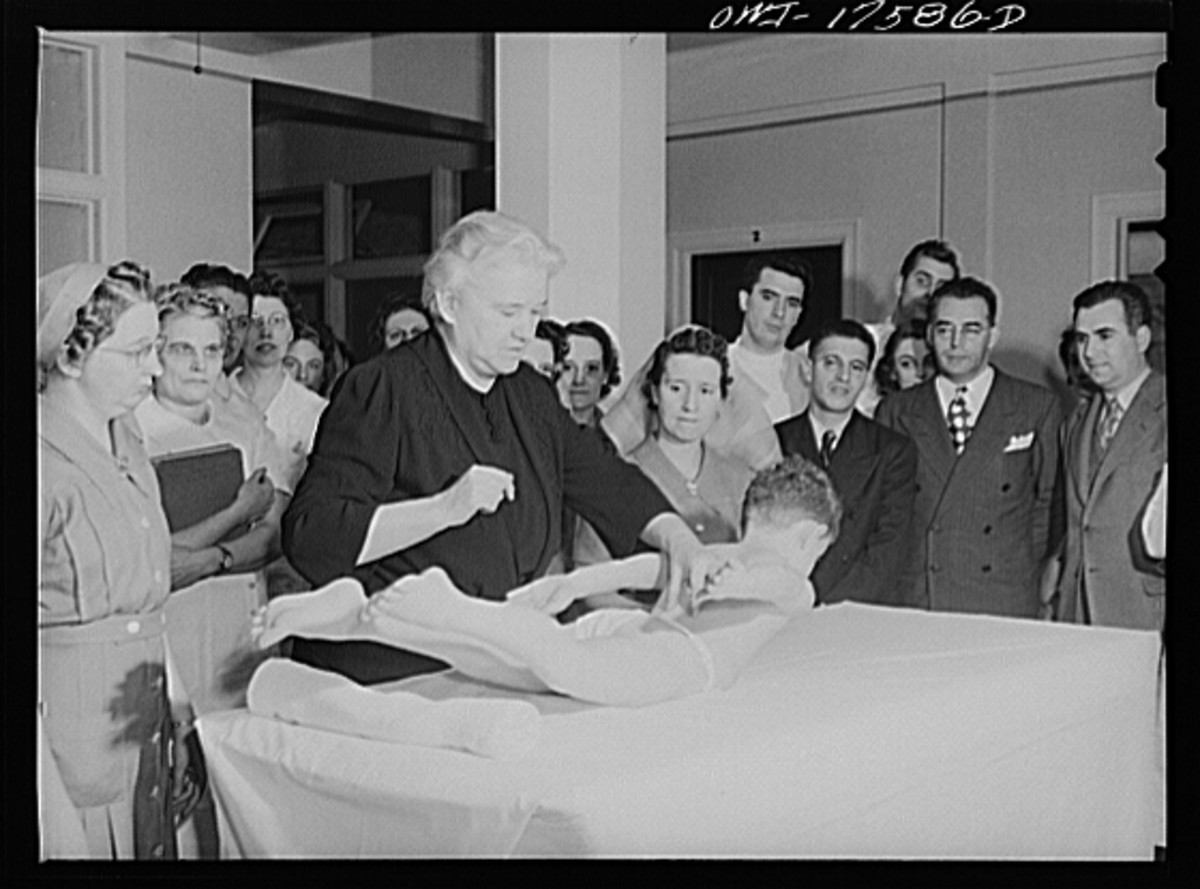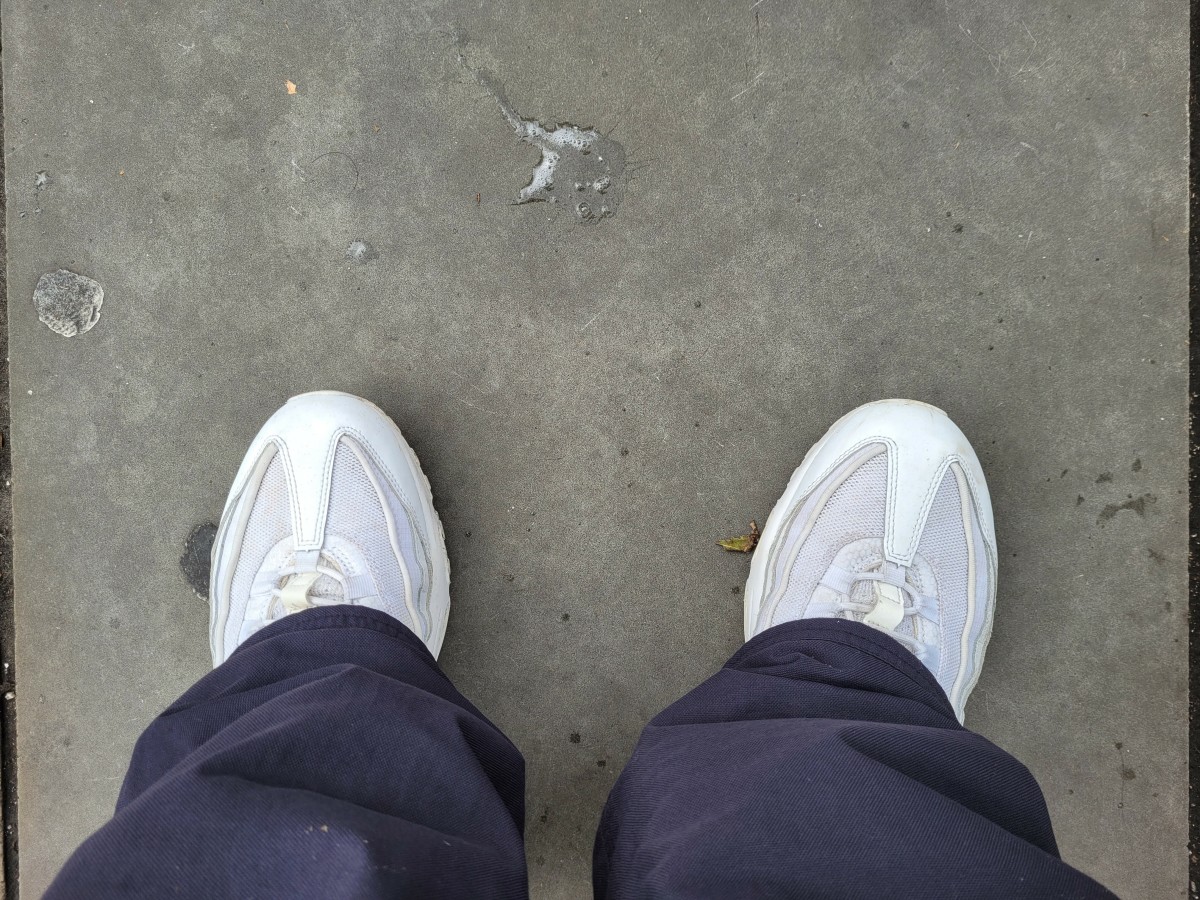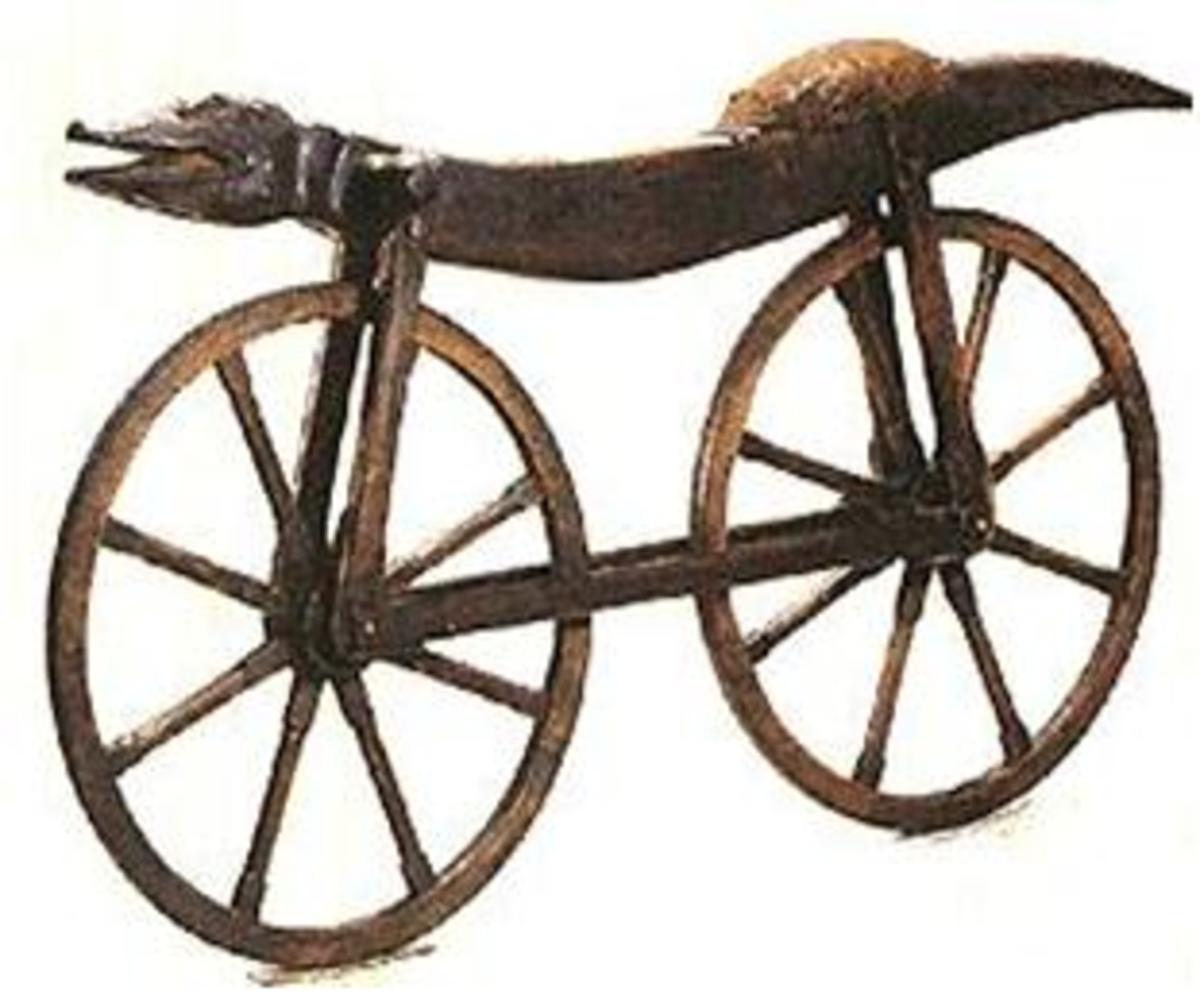Money carries germs from person to person.
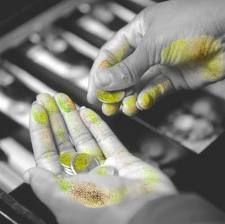
How Many Germs are on the Money We Use?
Info sourced from chronicle.augusta.com
Think about it. Whether you have a lot of it or hardly any, money is one of the dirtiest things you're likely to handle every day.
Kids, and even some adults, stuff their shoes with money, and a few women will pull wads of cash out of their undergarments. You really don't know where that dime or dollar has been, or what nasty stuff might be on it.
That legal tender in your wallet has been passed around from hand to hand, person to person and possibly traveled the world and back.
So, how worried should you be?
Experts say your mother was right when she warned you to not put money in your mouth. But while there is plenty of grime and dirt on our American currency, there's not enough to kill you, said Yvette McCarter, professor of pathology at the University of Florida College of Medicine at Jacksonville and director of the clinical microbiology lab.
"Mostly, there will be normal skin and environmental stuff on the money," McCarter predicted.
Really? Is that all? In this era of worries over infections and germs - witness the rise in popularity of anti-bacterial soaps and headlines seemingly every other day about food-borne illnesses - we wanted to know for sure.
We collected cash - paper money and coins - from fast-food restaurants, banks and other local businesses until we had a variety of crumbled, soiled and marked-up money, including a yellowed dollar bill from 1969.
Next step was McCarter's lab for testing, to see what sorts of diseases, bacterium, perhaps traces of drugs and other icky stuff we've been carrying around in our pockets.
In her lab, McCarter "pressed" the money onto Mueller-Hinton agar plates - sort of like petri dishes, where bacteria can grow and be analyzed. She added a few drops of normal saline liquid and told us to come back the next day for the results.
It wasn't nearly as bad as we feared. The results were right there, exactly as she predicted - normal skin and environmental stuff in quantities far too small to cause an outbreak. No Ebola. No flesh-eating bacteria. No swine flu.
That doesn't mean you should let your guard down. While our sample turned out to be relatively "clean," consider this: In a similar 2001 experiment, researchers from the Wright-Patterson Air Force Base Medical Center in Dayton, Ohio, exchanged 68 new dollar bills for old, worn ones with people at a grocery store and a sporting event.
The findings, reported in an ABC News segment, showed five of the bills contained bacteria that can cause an infection like influenza in healthy people, 59 contained bacteria that can cause serious illness in those with weak immune systems, and four were relatively germ-free.
The researchers found that while money contaminated with bacteria can spread these organisms, the risks to the average consumer are low - and perhaps there's more bacteria on that shopping cart you are pushing.
That's exactly what Noel Gomez said of our experiment, too.
"The organisms isolated from [your] project represent a small number of other potential bacteria that might have been found," said the UF & Shands Clinical Microbiology lab supervisor. "It's possible that bacteria such as E.coli and pathogens such as MRSA [flesh-eating bacteria] can be found on money. One thing to consider, though, is that most bacteria die on most surfaces within hours if not given a food source and proper temperatures in which to grow."
However, Gomez added that if E.coli and MRSA were found in large quantities on heavily soiled paper money, and a person handling that money immediately touched an open sore, there would be a greater chance that person might get an infection.
Because the UF & Shands lab doesn't test money for traces of drugs, and the Florida Department of Law Enforcement's lab was too busy testing regular cases, we were unable to see if there were illegal drugs on our cash. However, other studies have found traces of cocaine on a lot of money, particularly $20 bills.
A little bacteria isn't necessarily a bad thing, McCarter said.
"Frankly, there's more things to worry about than the bacteria on money," she said. "It's good to be aware of what's in our environment, new organisms and infections. But, since we were born we've been exposed to normal, everyday bacteria and it's not enough to worry about. Besides, there's probably more bacteria on your toothbrush than on your money."
Tell that to Sophia Huland, a teller at the SunTrust Bank branch in the Modis Building downtown. She and fellow colleagues work in a hands-on, people-based business handling money from various sources every day.
Even though Huland said her bank promotes a healthy and sanitary work environment by providing hand-sanitizer bottles at each workstation, and by following a "bank-industry rule" to refuse to accept currency that is visibly contaminated, she and the others still remain proactive about how they handle incoming currency.
"Sometimes, if the money looks really worn or soiled, we'll accept it and then put it off to the side and it's flagged so that it doesn't get back into circulation," she explained.
Huland recalled one unnerving incident at a South Carolina bank where she worked.
"A client came in to exchange money his dog had swallowed and later expelled," said Huland. "Although he said he washed off the feces, I was horrified."
So how can you keep yourself safe from dirty money?
McCarter advises using common sense and washing your hands after handling money. But, she says if you forget, don't fret, a little "normal flora" or good bacteria is actually good for us every now and then as it helps keep the other crud away.
Want another option?
You could move to Japan, where money is "laundered," literally.
One of Japan's leading banks, Sanwa, installed its first "clean ATM" machine at a branch in Tokyo in the mid-1990s. The ever-appreciative and clean-seeking Japanese flocked to the wonder machine, for the potential to have the cleanest money ever. Customers would insert their yens into the machine, which would then be treated to a heat process of 392 degrees, claiming to kill 90 percent of germs and bacteria before dispensing back to customers.
"What a novel idea," said McCarter. "Except, the minute you pick up that paper money again, it becomes contaminated with your normal flora!"
So much for clean money.
As for Gomez, he sized up that getting germs from money won't be a problem for him. Why?
"Because I always use a debit card."
By Joy Batteh-Freiha
joy.battehfreiha@jacksonville.com, (904) 359-4058
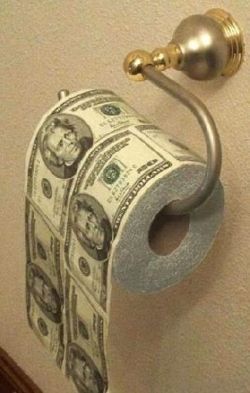
Add responsible money handling to your personal infection control plan. Money is Dirty!
Hygiene doesn't need to be complicated. It takes dedication to a small number of infection control principles. Responsibility with money can be one of those principles that can keep you healthier. Depending on the money handled, there are thousands to millions of germs ready to be passed to your hands.
You can't control where the money came from, but you can control how it is treated in your possession. One of the best things you can do is to wash your hands after every time money is touched. If there is no water, carry a hand sanitizer to make sure you're taking care of the germs.
Also, carrying a credit or debit card cuts down on the amount of germs. You can control where your credit or debit card goes whereas money changes hands of all types of people (and circumstances).
We almost all have the bad habit of touching our face (eyes, nose or mouth). Having germs on your hands as you touch your face can spell a lot of trouble! Keeping a simple hygiene plan will help OUTFOX infection in order to avoid illness and disease.

Dirty Money Equivalent to Licking Toilet?
Handling money and then putting your hands in your mouth or around your face is often like licking a toilet!? Germs are passed from hand to hand as money is being used.
You use money almost everyday and you never know where the change you get has been. You may consider it a germaphobe principle, but there are many studies behind the germ content on money.
Be smart and decide to wash or sanitize after handling money... and letting your children suck on money is downright wrong!
Money germs come from:
-Sweaty back pockets
-Food covered bills
-Floors
-Stripper G strings
-Drug exchanges
-Casinos
-Dirty people
Hand Washing vs. Hand Sanitizer - You tell us!
Do you consider Hand Sanitizer enough to ward off germs?
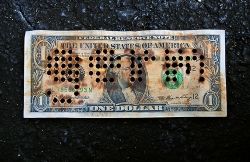
Paper Money Makes the Germs Go 'Round
Sourced from The Gazette (Canada)
"...Only seven per cent of the bills in that study were found to be germ-free.
"For a healthy individual, contact with most of these bacterial organisms is no big deal because we all have all kinds of bacteria on our hands," Ender said recently in a telephone interview from his home in Bethlehem, Pa.
"We were interested in whether resistant strains of bacteria could make it to patients in hospitals through their friends and relatives who had handled (dirty) money," he explained.
Ender said he doesn't worry about handling money with his bare hands, because he washes his hands "dozens of times a day."
He advised the public that frequent handwashing with soap and water is still the best way to prevent infections and disease.
So could dirty money be a vehicle for the current epidemic of viral gastroenteritis sweeping Montreal health-care centres?
"It's certainly possible," Ender said.
"However the Norwalk-type virus is highly contagious via multiple modes, be that hand to hand, surface contact or vomitous particles suspended in air."
Lefebvre agreed that money could theoretically act as a conduit for all kinds of germs and viruses.
But he noted bills are usually handled less than things that are grabbed with the whole hand, like shopping-cart handles, metro car grab bars, doorknobs - or that water glass in the bathroom.
mlalonde@thegazette.canwest.com
Cash is a big culprit in spreading infections
Anything that is passed from hand to hand is likely to be contaminated with the germs and viruses we typically have on our skin, so money is an obvious culprit when it comes to spreading illness.
Here are some of the bacteria
typically found on paper bills:
Staphylococcus aureus: A bacterium commonly found in the nose of a healthy person that can cause a range of symptoms, from minor skin infections and abscesses to potentially fatal illnesses like pneumonia, meningitis, endocartitis, toxic shock syndrome and septicemia.
Klebsiella pneumoniae: A bacterium commonly found on skin and in the mouth and intestines that can cause bacterial pneumonia. The most common transmission mode is fecal-oral. The bacterium can cause flu-like symptoms, the coughing up of blood-tinged sputum, broncho-pneumonia, bronchitis and urinary tract infection.
Streptococcus: A bacterium commonly found on skin and in the mouth, intestine and upper respiratory tract that can cause strep throat, meningitis, bacterial pneumonia, endocarditis, erysipelas and necrotizing fasciitis (flesh-eating infection).
Enterobacter: A species of bacteria commonly found in the human
intestinal tract that can cause opportunistic infections of the urinary tract as well as other parts of the body, and are sometimes associated with respiratory tract infections.
Pseudomonas: These bacteria can lead to urinary tract infections, sepsis, pneumonia, pharyngitis and other potentially fatal illnesses. They are rarely a cause of infection in healthy people, but can be very dangerous to those with compromised immune systems or individuals with catheters or on respirators.
What you can do: Health authorities stress the importance of washing hands thoroughly and often, especially before and after eating, after using the toilet, after handling paper money, before and after handling food, and before and after visiting hospitals." (Sourced from and can read the whole article here: http://www2.canada.com/montrealgazette/news/story....
Hand Washing Posters on Amazon
Hand Washing is the single best habit to adopt to avoid germs.
Teach Hygiene Principles with this Manual!
This manual has received great reviews from a variety of users. It teaches hand washing, environmental cleaning, good hygiene habits and other infection control principles. Use it is hospitals, clinics, continuing education courses, EMT courses, restaurants, schools, childcares and other groups.
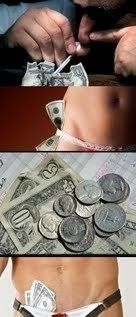
How to Teach Others About Dirty Money?
Ok... So now you know that money is dirty and passes germs around. What can you do to teach others around you so there is less infection spread? Get a lesson together that will give a great gross out factor AND teach better hand hygiene.
The recommended lesson uses Glo Germ simulation germs and a black light. The simulations germs come in powder form which represent the germs spread as people touch and pass on money. The powder is fluorescent and shines brightly under a UV black light.
There are a number of ways you can use the simulaiton germs. You can put the fluorescent germs on the person's hands, give them a dollar to "infect" and then have them pass it to another person. After the pass of the bill, use the black light in a dark room to see how far the germs traveled!
You can also secretly "infect" a dollar and have someone handle it. Once they've handled the bill and touched their face, etc. Show the person with a black light how germs travel from our hands to other parts of our body quickly.
This lesson has been very effective! To purchase or further investigate see this link: http://www.outfoxprevention.com/home/handwashing-k...

